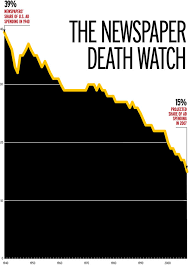 That's the question asked by Washington Post columnist Marc Fisher this morning.
That's the question asked by Washington Post columnist Marc Fisher this morning.Across the nation, it's not just that fewer reporters are covering state government; newspapers and TV stations are also devoting far less space and time to that news.
Does that mean citizens are less well-informed? Do blogs and other new media fill in where old media are cutting back? Is it really a loss if reporters cover fewer legislative debates?
The short answer to that last question, in this blogger's opinion, is strongly "yes." I agree with all of the following quotes.
*The smaller the press corps gets, the more you see personality stories rather than pieces about what is at stake for people." - Tim Kaine
*"What you want is an informed and engaged population, but with less manpower and less space, there just isn't the opportunity to talk about many topics that lie beneath the marquee issues." - Bill Bolling
*"...it's not just the bodies that are gone -- it's the institutional memory and knowledge." - Bob Lewis (veteran AP Richmond reporter)
"Something will rise to fill the news vacuum, someday. In the meantime, the lobbyists are getting the news they need. The voters, not so much." - Marc Fisher
In short, the decline of the "mainstream" media (aka, "corporate" media, "legacy media") is not a good thing in any way, shape or form. As you probably know, I'm a big fan of the netroots. This does not, however, mean that I'm a big fan of all, or most, or even many blogs. In fact, to be blunt, I think that most (vast majority of?) blogs are not particularly helpful when it comes to independent reporting, in-depth investigative journalism, or the depth of coverage that used to be offered by the corporate media.
What I'm even more concerned about is that, not only are traditional news sources dying out fast -- with each week bringing news of layoffs, cutbacks, or even Chapter 11 filings by venerable U.S. newspapers (e.g., the Christian Science Monitor, the Philadelphia Inquirer, the Chicago Tribune, the LA Times, the Hartford Courant, etc., etc.) -- but there remains no serious "business model" for blogging, except for a few high-traffic, national or niche blogs that receive huge traffic (e.g., Huffington Post, Daily Kos, BoingBoing, Gizmodo, Talking Points Memo, Gawker). On the state level, even leading blogs often receive just a few hundred visits per day, with top blogs receiving a few thousand visits per day. Raising Kaine, for instance, was average around 3,000 visits per day in "normal" months, about 6,000 visits per day leading up to elections. Even so, RK was certainly not making enough money to support even one person (even at poverty wages), let alone an entire staff of writers and reporters. I use this example not to moan or complain, simply to highlight my fundamental concern with the decline of the corporate media; while their business model dies, there's no "business model" for state, local, or even national blogs (with a very few exceptions) to replace them. And even if there was, there's no reason to think that political blogs run by 1 or 2 people, mostly working at it part-time, can do what an entire newspaper bureau, with full-time staff and other resources, can do.
True, technology can address some of this; Richmond Sunlight, for instance, is a great resource (if you know about it) for tracking legislation in the Virginia General Assembly. But, I wonder, how many people use that site compared to how many people used to read the Washington Post (or LA Times or Hartford Courant) "dead tree" edition 10, 20 years ago? I'm also concerned about the issues raised here:
The worrisome thing about Google News though is the multiplicity of news sources that go into the coverage of each story. The students in their haste don’t always distinguish between the sources, all too often missing the inherent political biases that can push the coverage of a story more favourably to the right or to the left. To them, article 46 is just as good as article 47 on the subject of say today’s comeback victories by Hillary Clinton.This points to one of the major advantages of having top-notch, full-time, professional journalists like Bob Lewis, Warren Fiske and Michael Sluss out there. Can an army of Kenton Ngos and Bryan Scraffords compensate for the loss of people like this? As great as Kenton and Bryan (and many others) are, I doubt it, as long as there's no business model for bloggers to do this part time.
Then, there's the issue of "bias." By definition, political bloggers are not objective. Nor should they be, necessarily. I don't necessarily see that as a major problem, no more so than in countries where they've got the "Communist," "Fascist," "Christian Democrat," and "Socialist" newspapers. Here in the United States, we have newspapers and other "old media" outlets with blatant biases (e.g., Faux News, right-wing talk radio, the Moonie Times, liberal magazines). That's fine, as far as I'm concerned; as long as you have access to different viewpoints, you can pick and choose, compare and contrast, and decide for yourself.
In the end, what I'm really worried about here is the loss of counterweights to corporations and other permanment, powerful interests. On this count, Marc Fisher says it best: "...the lobbyists are getting the news they need. The voters, not so much." And the lobbyists aren't going away; in fact, they'll likely rise in power as the watchdogs on them go away. Dominion lobbyists running amok without any reporters to keep an eye on them? I don't know about you, but that doesn't exactly give me a "warm and fuzzy" feeling.

